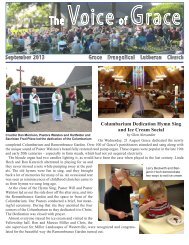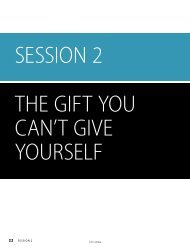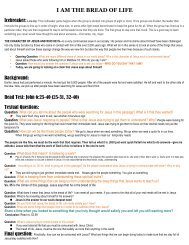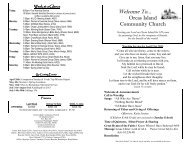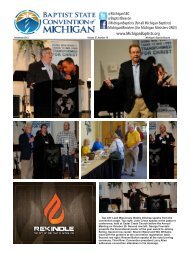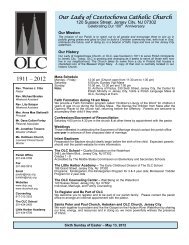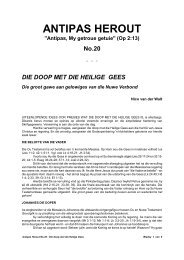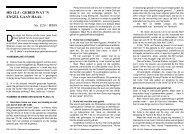Silicon Snake Oil: Second Thoughts on the Information ... - Clover
Silicon Snake Oil: Second Thoughts on the Information ... - Clover
Silicon Snake Oil: Second Thoughts on the Information ... - Clover
Create successful ePaper yourself
Turn your PDF publications into a flip-book with our unique Google optimized e-Paper software.
<str<strong>on</strong>g>Silic<strong>on</strong></str<strong>on</strong>g> <str<strong>on</strong>g>Snake</str<strong>on</strong>g> <str<strong>on</strong>g>Oil</str<strong>on</strong>g>: <str<strong>on</strong>g>Sec<strong>on</strong>d</str<strong>on</strong>g> <str<strong>on</strong>g>Thoughts</str<strong>on</strong>g> <strong>on</strong> <strong>the</strong> Informati<strong>on</strong> Highway<br />
by Clifford Stoll<br />
New York: Anchor, 1995<br />
Reviewed by David W. Gill www.ethixbiz.com<br />
Clifford Stoll describes himself as "an astr<strong>on</strong>omer, computer jock, and weekend plumber" in Oakland<br />
California. He was also <strong>on</strong>e of <strong>the</strong> pi<strong>on</strong>eers of <strong>the</strong> Internet, but now is a bit of a "backslider" whose<br />
"sec<strong>on</strong>d thoughts <strong>on</strong> <strong>the</strong> informati<strong>on</strong> super highway" are a valuable counterpoint <strong>the</strong> euphoria of authors<br />
like Nicholas Negrop<strong>on</strong>te and Bill Gates. No doubt, Stoll, writes, <strong>the</strong> Internet has its challenging, fun, and<br />
useful side. But what is <strong>the</strong> price? What are we trading off to get <strong>on</strong> this highway? Stoll argues that <strong>the</strong><br />
medium is being oversold and that <strong>the</strong>re is too little critical discussi<strong>on</strong>.<br />
What are <strong>the</strong> problems that Stoll sees? First, a great deal of time is demanded just to keep up with <strong>on</strong>e's<br />
e-mail, chat groups, and Internet explorati<strong>on</strong>s. Little Internet informati<strong>on</strong> is genuinely useful and what is<br />
<strong>the</strong>re is often a distracti<strong>on</strong> from reality. Life <strong>on</strong> <strong>the</strong> Internet is passive ra<strong>the</strong>r than active; computer<br />
networks isolate us from <strong>on</strong>e ano<strong>the</strong>r, cheapen <strong>the</strong> meaning of actual experience, work against literacy<br />
and reality, and undercut our schools and libraries. Schools are being sold down <strong>the</strong> networked river,<br />
induced to "spend way too much <strong>on</strong> technological gimmicks that teachers d<strong>on</strong>'t want and students d<strong>on</strong>'t<br />
need" (p. 11).<br />
"Few aspects of daily life require computers, digital networks, or massive c<strong>on</strong>nectivity" (p. 10). Stoll<br />
gives l<strong>on</strong>g lists of such important n<strong>on</strong>-computer activities: baking bread, curling up wth a good novel, and<br />
hanging out with friends. He quotes Thoreau's famous comment in Walden: "Our inventi<strong>on</strong>s are w<strong>on</strong>t to<br />
be pretty toys, which distract our attenti<strong>on</strong> from serious things. They are but improved means to an<br />
unimproved end" (p.15).<br />
Despite c<strong>on</strong>trary claims, in reality <strong>the</strong> Internet is painfully slow (especially during business hours). Just as<br />
all highway building has led to more traffic c<strong>on</strong>gesti<strong>on</strong>, bandwidth expansi<strong>on</strong>s are doomed to be forever<br />
glutted with as much or more traffic than <strong>the</strong>y can possibly bear (pp. 206-7). And <strong>the</strong> equipment itself is<br />
not at all perfectly reliable: "I spend almost as much time figuring out what's wr<strong>on</strong>g with my computer as I<br />
do actually using it" (p. 3)<br />
More than its inefficiency, <strong>the</strong> abysmal quality of informati<strong>on</strong> <strong>on</strong> <strong>the</strong> Internet is Stoll's frequent refrain:<br />
"Look at <strong>the</strong> detritus, dross, and dreck sold <strong>on</strong> <strong>the</strong> televisi<strong>on</strong> home-shopping channels"(p. 18): <strong>the</strong> same<br />
will be available <strong>on</strong> <strong>the</strong> computer shopping network. A 500 channel cable system will surely deliver<br />
"unfathomable and boundless mediocrity" (p. 21). "Instead of an Internet-inspired renaissance, mediocre<br />
writing and poorly-thought-out arguments roll into my modem (p. 26). The Internet is a great medium for<br />
trivia and hobbies, but not for reas<strong>on</strong>ed reflective judgment or true creativity. Data, informati<strong>on</strong>,<br />
knowledge, understanding, and wisdom are different things. The Internet provides mountains of data,<br />
some informati<strong>on</strong>, a little knowledge and understanding, but no wisdom. Educators are falling for a bogus<br />
promise when <strong>the</strong>y invest in computers instead of teachers and books (pp. 130ff). Scarce resources are<br />
being wasted, <strong>the</strong> informati<strong>on</strong> gained is of doubtful value, and true creativity is stifled ra<strong>the</strong>r than<br />
unleashed. "Creative people are ill-adapted for survival around computers. . . <strong>the</strong> medium in which we<br />
communicate changes how we organize our thoughts. We program computers, but <strong>the</strong> computers also<br />
program us" (46). Creativity is c<strong>on</strong>fined within narrow boundaries established by <strong>the</strong> medium itself.<br />
Interpers<strong>on</strong>al relati<strong>on</strong>ships and communicati<strong>on</strong> are also harmed at least as much as helped by <strong>the</strong><br />
Internet. "An<strong>on</strong>ymity and untraceability seem to bring out <strong>the</strong> worst in people" (p. 57). Computer<br />
networks isolate us from <strong>on</strong>e ano<strong>the</strong>r, ra<strong>the</strong>r than bring us toge<strong>the</strong>r. "Electr<strong>on</strong>ic communicati<strong>on</strong> is an<br />
instantaneous and illusory c<strong>on</strong>tact that creates a sense of intimacy without <strong>the</strong> emoi<strong>on</strong>al investment that<br />
leads to close friendships. (p. 24).
"The key ingredient of <strong>the</strong>ir silic<strong>on</strong> snake oil is a technocratic belief that computers and networks will<br />
make a better society. Access to informati<strong>on</strong>, better communicati<strong>on</strong>s, and electr<strong>on</strong>ic programs can cure<br />
social problems . . . [But] access to a universe of informati<strong>on</strong> cannot solve our problems: we will forever<br />
struggle to understand <strong>on</strong>e ano<strong>the</strong>r. The most important interacti<strong>on</strong>s in life happen between people, not<br />
between computers" (p. 50).<br />
It is important to recall, of course, that an<strong>on</strong>ymous hate messages are already enabled by c<strong>on</strong>venti<strong>on</strong>al<br />
mail and teleph<strong>on</strong>e calls, and that pounds of unsolicited junk mail are accompanied by daily telemarketing<br />
intruders. But Stoll has written a very important book, whose credibility and persuasiveness is multiplied<br />
by his experience with <strong>the</strong> Internet and by <strong>the</strong> fact that he "has a life"---in sharp c<strong>on</strong>trast to <strong>the</strong> sterile,<br />
narrow existence reflected in most computer nerd tracts



